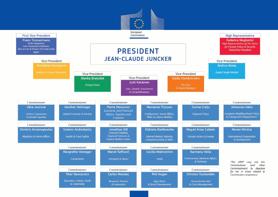17 de Septiembre de 2014
FSG - Internacional
 El Presidente electo de la Comisión Europea, Jean-Claude Juncker, ha presentado su propuesta de equipo de Comisarios y la nueva estructura de la Comisión Europea. Ni sus prioridades estratégicas para la legislatura que comienza, recogidas en un documento de 10 Directrices Políticas, ni la composición de la nueva Comisión, señalan como prioridad la lucha contra la pobreza y la exclusión social, uno de los objetivos establecidos en la Estrategia Europa 2020.
El Presidente electo de la Comisión Europea, Jean-Claude Juncker, ha presentado su propuesta de equipo de Comisarios y la nueva estructura de la Comisión Europea. Ni sus prioridades estratégicas para la legislatura que comienza, recogidas en un documento de 10 Directrices Políticas, ni la composición de la nueva Comisión, señalan como prioridad la lucha contra la pobreza y la exclusión social, uno de los objetivos establecidos en la Estrategia Europa 2020. El pasado 10 de septiembre se hizo pública la estructura y composición de la futura Comisión Europea, un Colegio de 27 Comisarios, designados por el Presidente electo, el luxemburgués Jean-Claude Juncker, cuya estructura se establece en torno a 7 Vice-Presidentes, responsables de las prioridades estratégicas, y que tendrán asignados equipos de Comisarios por proyecto. Si bien todos ellos deberán pasar por la aprobación del recientemente elegido Parlamento Europeo, todo apunta a que los Comisarios designados ahora por Juncker formarán parte de la futura Comisión Europea.
Ya en el mes de julio se hizo público el documento “Un nuevo comienzo para Europa: mi Agenda en materia de empleo, crecimiento, equidad y cambio democrático. Directrices políticas para la próxima Comisión Europea”, donde Jean-Claude Juncker recogía sus compromisos y prioridades políticas de cara a los próximos años. Los objetivos sociales están prácticamente ausentes de su agenda y el reciente anuncio de la nueva estructura y composición de la Comisión Europea confirman que la lucha contra la pobreza y la exclusión social no son una prioridad para la futura Comisión Europea.
La Inclusión desaparece de la cartera del actual Comisario de Empleo, Asuntos Sociales e Inclusión, László Andor, que será sustituido en buena parte de sus actuales responsabilidades por la belga Marianne Thyssen, futura Comisaria de Empleo, Asuntos Sociales, Capacidades y Movilidad Laboral, que trabajará dentro del equipo del Vice-Presidente Jyrki Katainen, responsable de la estrategia más amplia de Empleo, Crecimiento, Inversión y Competitividad. El cambio en el título de la Comisaria apunta a que la prioridad en dicha cartera será exclusivamente la creación de empleo sin tener en cuenta los objetivos de lucha contra la pobreza y la exclusión social, que no aparecen recogidos en ninguna otra cartera. En un contexto donde crece el número de ciudadanos europeos que viven en riesgo de pobreza o bajo el umbral de la pobreza (se estima que en torno a 120 millones) y aumentan las desigualdades sociales, es preocupante que la futura Comisión Europea no se plantee defender de manera más contundente los objetivos sociales de la Estrategia Europa 2020.
La actual cartera de Justicia, Derechos Fundamentales y Ciudadanía, que ha estado a cargo de la Vice-Presidenta Viviane Reding, y donde se enmarca la Unidad de Coordinación de las Políticas hacia la Población Gitana, aparece en la nueva estructura dividida en varias carteras. La defensa de derechos aparece en la futura Comisión bajo el mandato del Primer Vice-Presidente y mano derecha de Jean-Claude Juncker, el holandés Frans Timmermans, quien se encargará de Mejor Regulación, Relaciones Inter-institucionales, Estado de Derecho y Carta de Derechos Fundamentales. Entre las responsabilidades que le asigna el Presidente electo, Timmermans deberá asegurarse de que cualquier propuesta o iniciativa de la Comisión está en línea con la Carta de Derechos Fundamentales, y una de sus tareas prioritarias será concluir el proceso de adhesión de la Unión Europea a la Convención para la Protección de los Derechos Humanos y Libertades Fundamentales del Consejo de Europa, dando respuesta así a la demanda generalizada de incrementar los estándares internos de defensa de los derechos fundamentales dentro de la Unión Europea, y no solo exigirlos en las relaciones con terceros países, como se ha hecho hasta ahora. Una buena noticia para la ciudadanía europea.
La checa Vera Jourová será la futura Comisaria de Justicia, Consumidores e Igualdad de Género, a cuyo cargo tendrá, entre otras responsabilidades, la Dirección General de Justicia y las relaciones con la Agencia Europea de Derechos Fundamentales (FRA). Trabajará en el equipo del Primer Vice-Presidente Timmermans, y una de las tareas que le asigna el Presidente electo Juncker es la elaboración de una Directiva Antidiscriminación. Es de esperar que las prioridades de la futura Comisaria Jourová vayan más allá de la Igualdad de Género, tal como aparece en su título, y asuma de manera transversal la lucha contra la discriminación y la promoción de la igualdad en todas sus categorías como una prioridad bajo su mandato.
En la nueva estructura de la Comisión Europea, la Ciudadanía ya no aparece vinculada a los Derechos Fundamentales, sino a la Educación, Cultura y Juventud, en una cartera que ocupará el futuro Comisario Tibor Navracsics, de nacionalidad húngara. Aunque aparezca como una cartera menor, el Comisario Navracsics tendrá entre sus competencias la consecución de uno de los objetivos prioritarios de la Estrategia Europa 2020, reducir la tasa de abandono escolar a menos del 10 % y aumentar hasta el 40 % la tasa de titulados de la enseñanza superior.
La cartera de Política Regional, responsable de la Política de Cohesión de la Unión Europea y, por tanto, de la coordinación de los Fondos Estructurales y de Inversión, estará a cargo de la Comisaria rumana Corina Cretu. Los fondos europeos suponen en muchos países una buena parte de los recursos disponibles para la cohesión social, y son fundamentales para contribuir a los objetivos sociales de la Unión Europea. Comienza este año un nuevo periodo de programación de los Fondos Estructurales y de Inversión (2014-2020) y la dirección que marque la nueva Comisaria de Política Regional será clave en la ejecución de los Programas Operativos.
La Comisión Europea ha sido tradicionalmente punta de lanza en el impulso de políticas de promoción social, de lucha contra la pobreza y la exclusión social, así como en la defensa de derechos y la igualdad de trato de todos los ciudadanos, lo que se ha traducido en la práctica a nivel nacional en decisiones políticas, desarrollo normativo y asignación de recursos en esa dirección. La población gitana, al igual que el resto de la ciudadanía europea, ha salido reforzada de ese impulso social, ahora más necesario que nunca.
La retirada de la Inclusión de la cartera de los Comisarios es una señal nada esperanzadora para los grupos más desfavorecidos, como la población gitana, de por dónde pueden ir las prioridades de la futura Comisión. En el proceso de aprobación del futuro Colegio de Comisarios, el Parlamento Europeo debería poner especial atención en que el diseño del futuro ejecutivo comunitario promueve un espacio de derecho e igualdad para toda la ciudadanía y favorece el cumplimiento de todos y cada uno de los objetivos de la Estrategia que la Unión Europea se marcó para 2020, incluida la reducción de la pobreza.
Confiamos en que la inclusión de la población gitana continúe estando en la agenda política de la Comisión Europea y que así aparezca reflejado tanto en sus prioridades como en el reparto de responsabilidades entre las distintas carteras. No sabemos por el momento si en la estructura de la futura Comisión está previsto dar continuidad a la Unidad de Coordinación de las Políticas hacia la Población Gitana, pero entendemos que sería un paso atrás no reconocer la necesidad de abordar la situación de la población gitana en la Unión Europea desde un enfoque multidisciplinar y, por tanto, desde diferentes ámbitos políticos que requieren de una coordinación institucional.
Más información sobre la futura Comisión (en español) https://europa.eu/rapid/press-release_IP-14-984_es.htm
Los futuros Comisarios (en inglés): https://ec.europa.eu/about/juncker-commission/commissioners-designate/index_en.htm


GITANOS.ORG

GITANOS EN LA PRENSA
